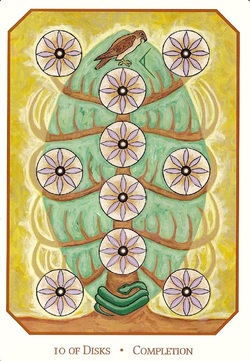 For this week's Card of the Week, we have the Ten of Pentacles reversed, from the Babylonian Tarot by Sandra Cicero.
I really like the simplicity of this deck's style while adding a lot of details that add depth to a reading. While I don't know anything about Sumerian cosmology, the illustration for the Ten of Pentacles (which is given the keyword 'completion' here) puts me in mind of the Kabbalah's Tree of Life. The hawk at the top of the tree, and the snake at the bottom, put me in mind of "as above, so below", the idea that the heavens are reflected here on earth and vice versa. On a more mundane level, I think it's only too appropriate that there's often a lot of plant imagery in the Pentacles suit. It's the card of practical, solid things, and of growth in the earth, so what better symbol for the culmination of all that than a tree?
Numerology-wise, the Tens mean the end of one cycle and the beginning of another. When you're dealing with the Ten of Pentacles, you're looking at a stable home or family, a job with a solid foundation, a business established and thriving. But if we're keeping the tree metaphor in mind, it's like fruit that's ripe and ready for harvesting. We reap the rewards, but that doesn't mean the tree stops growing. We tend and care for it, getting ready for the next cycle of growth. And if we don't pick the fruit in time, it grows overripe and we miss our chance.
I think that's the reversal coming into play - letting your stability turn stagnant or useless, not turning it into a fresh cycle of new growth. Or you could not recognize the good thing when you have it, and fail to take advantage of or appreciate it.
This week, think about the elements of your life that are exactly where you want them to be, completely satisfying. Are you practicing gratitude for the blessings in your life? And are you staying where things are prosperous and safe, or are you preparing yourself for the next challenge? The only constant in life, after all, is that we're always continuing to grow.
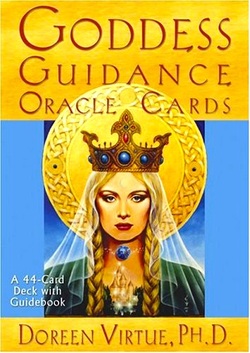 I have a confession to make, and it's one I've been putting off for a long time.
I've been experimenting...
With oracle cards.
The Doreen Virtue Goddess Guidance cards, to be specific, with the sparkly gold edges the pretty, soothing pictures of gorgeous women. The sweet, "non-threatening" messages.
And okay, okay, I jest. There is nothing wrong with oracle cards - they're lovely! And fascinating! There's so much variety! But I was always a bit skeptical about Ms. Virtue. Not because she's doing it wrong - no one is doing it wrong. But I didn't know if she was for me.
I don't know if I believe in Indigo children, you see. Angels and faeries do incredible things for some people, magickally and spiritually - I've met just as many people who say these are powerful forces you don't want to mess with idly. (I've got no idea how they got such a different set of references.) And then there's Doreen Virtue's Tarot deck, in which she claimed she'd removed anything "threatening" or "scary" - when really, the only thing scary about Tarot is how it might tell you there's things in your life that need a little work. Why would I want to avoid anything that might tell me the truth?
But I kept running into these cards, over and over again. Different readers would pull them to supplement a reading. They were out for display at my favorite occult shop, and I couldn't stop staring at them. And finally, a financial windfall came my way to treat myself to some Amazon goodies, and I put them on the order list.
What strikes me first about these cards is the artwork. It's so lush and also so varied, in different styles and forms of expression that let you really feel the personality of each goddess as the cards express them. You could use these cards meditatively if you like, delving into the details of each image and seeing what stands out to you. Or you could just treat the goddess in each card as a friend and a guide, as the deck encourages you to do. That'd trouble you, obviously, if you come from a faith that views these figures as literal beings who want to be called on and honored in a specific way, but as I'm more from the "facets of the same diamond" camp, I see the cards as having a unique energy that they bring with each individual message.
In general, oracle cards tend to be more specific than Tarot, more on point. That doesn't allow for a reading of more than a few cards, and it doesn't delve into complexity, but it provides an excellent springboard for deeper work. Reflecting on the energy of a single card can provide a lot of journal fodder, or maybe researching the nature of that goddess beyond the surface, learning the deeper aspects of her particular message. (I do wish the guidebook provided a little more insight into each individual goddess, and the legends that informed her message.)
There really is a lot of variety for "gentle, non-threatening" messages. Ishtar encourages you to set healthy boundaries, and Green Tara tells you that this may be a time to avoid harsh situations or environments. Kwan Yin tells you to be compassionate towards others, but most of all towards yourself. I realized very quickly that giving yourself kind, careful messages doesn't always mean avoiding truths. Certainly a few daily draws have already given me a lot of food for thought. But much like Tarot, it's up to me how deep I choose to go, whether I do the reflective work on what a particular card might mean to me. That provides a bit of extra responsibility on the part of the seeker, but I can't think of anything less coddling than that.
While Tarot's definitely my one true love as far as divination's concerned, I think I can count this experiment a success.
A Note From Kim: With my life coaching certification complete, I'm now available for free discovery sessions, one-time deep exploration, and monthly packages! To celebrate, have a look at this great little video from Tim Brownson (adaringadventure.com), who gives some great pieces of advice for all of us. We're all our own coaches first and foremost!
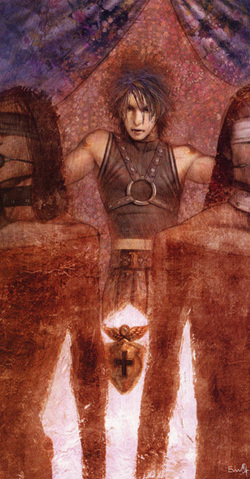 "Absolute power corrupts absolutely."
"The power of man has grown in every sphere, except over himself."
"If you want to test the mettle of a man, give him power."
When you're trying to grow anything of your own - confidence, creativity, self-love or self-discipline - power eventually comes up. What has power over you? What do you have power over, and what should you be able to control?
We're taught, probably for a good reason, to be afraid of having too much power over the world around us. After all, will we really know how to use it wisely? Will we wind up becoming one more person in a long line of bullies, acting only in our self-interests? Or are there institutions that have had power over us for too long, and is this the only way to make a stand?
The Tarot has a lot of cards about power, and in writing my upcoming course, I was surprised at how much crossover there was in just the first six. There's the Magician, who is a magical student, adept, or a stage magician and a shyster depending on who you ask. There's the Emperor, a ruler of men, and the Heirophant, a ruler of our traditions and institutions.
That's to say nothing of the cards that come later, such as the Chariot and Strength, who in many decks come right after each other. To me that's the story of "hard control" vs "soft control", of the times you have to take life by the reins and steer, the times you have to gently tame your inner beasts and demons. It's the Chariot I decided to put up as an illustration for just that reason. And wouldn't you know, my randomizer selected the Lunatic Tarot by Evan Yi Feng. It's one of the first decks I've ever seen where the charioteer isn't pulling horses, or a dark and light Sphinx, but instead is in command of human beings. That's scary - but the beauty of it is when you take a look at that illustration, if it's drawn in your reading, and say "am I exercising control or abuse of a situation?"
There are so many ways to use power, so many ways to define what it even is or where it belongs. That's why to me, power itself isn't a dirty word. We're afraid to call ourselves powerful, to say we have any kind of control. We think it'll make us scary, selfish, or egotistical. But if you don't have power over anything, ultimately it has power over you. You lose any kind of hold you might have over your own life, or the life you want to make for yourself.
"With great power comes great responsibility." And if you don't acknowledge your potential for power, you don't take responsibility for what's happening around you. The beauty of the Major Arcana is that we've been all its figures at one point, or will be someday. We've taken charge or been stuck in tradition, we've fought our problems with gentle grace or by reigning them in. If you don't like the role you see yourself playing, you can understand the part it's playing in your life, and make the choice to transform into another.
And that's the ultimate power over, and responsibility for, your own life. So who will you decide to be today?
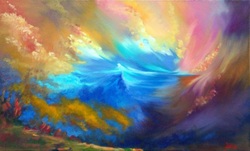 There's so much more to intuitive thinking than just psychic readings and spirit guides. While that's the end goal, developing yourself and your mind so you can be more in touch with the universe, here's a few things developing your intuition can teach you along the way. (image is "Intuition" by Bente Hansen) - Pay attention. The world has so much to say to you if you look around and see what it's telling you. You have so much to say to you, if you only tune in. If you learn to listen, you'll be open to more points of view and more possibilities.
- Slow down. We're so wrapped up in the world around us that we don't always take time to really see and feel what we're doing. Slowing down puts us in touch with our own bodies, with the things we want and need - which means we can take care of ourselves in a more profound way.
- You know more than you think you do. Gurus can point you in the right direction, and you can learn a lot from an outside perspective, but ultimately you're just as in touch with inner wisdom as everyone else. If you believe you'll see results from trusting your instincts, then you will, whether that's achieving your heart's desire or learning more about yourself to make it happen.
- The world is out to give you good things. Really. Even when everything is going horribly. There are no "bad" cards in Tarot, and there are very few 100% "bad" events in life. Our mistakes and our tragedies are tools to learning and developing into something greater than we are. Listening to your intuition means you have an internal guide all the time telling you how and why that is, and it makes the true lessons of the moment far easier to access and believe.
- You are magic. Listen to your intuition, and you'll realize all the miraculous things you've seen in movies are already part of you. As you unlock more and more of your own psychic potential, you'll realize that all the incredible things you ever wanted to do were already there to begin with, waiting for you to bring them out. Will you have natural talent to be an expert at everything? No. But you'll have access to it - to learning lessons from it, tapping into it, and growing from it. And you can make anything you want a part of the magic of your world.
"And you who seek to know Me, know that the seeking and yearning will avail you not, unless you know the Mystery: for if that which you seek, you find not within yourself, you will never find it without.
For behold, I have been with you from the beginning, and I am That which is attained at the end of desire." - The Charge of the Goddess, Doreen Valiente
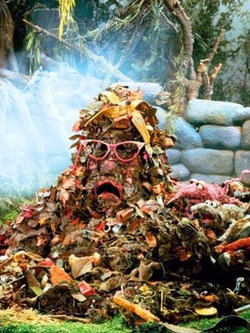 I've been rewatching a lot of Fraggle Rock lately, since my girlfriend with a decidedly HBO-deprived childhood has never seen it. Yeah, yeah, I'm a grown-up and I'm supposed to be above these things. But screw my credibility. There's a lot of simple wisdom in kids' stuff that we don't really remember to touch as adults, and it's Jim Henson, creator of the Muppets and Sesame Street, which should say it all.
And Fraggle Rock? Has to be the most pagan show I've ever seen. A living, breathing system of caves that teach about the interconnectedness of life? A festival where you compose tributes to the full moon? And if you want to teach a newly-minted teenaged Wiccan about why she can't be initiated just yet, just show her "Mokey and the Minstrels".
Then there's Marjory the Trash Heap, the "all-knowing" oracle who pings me quite a bit for obvious reasons. She demonstrates some genuine power and insight towards the end of the series, but mainly Marjory is kind of a shyster - someone who gives you not-quite-groundbreaking sayings or junk objects in the form of talismans. She does claim to be all-knowing, but the Trash Heap doesn't really take payment for her services. She's more than happy to dispense a little bit of cryptic practicality, watch the Fraggles mistake it for deep wisdom, and then let them work out their own problems with this new bit of direction. Her ultimate goal is the goal of all great oracles: to no longer be needed.
And often, the magic works. Anxious Boober feels a surge of courage when clutching a bottlecap inscribed with the words "no deposit, no return." Red and Wembley learn the charm of spilling a bottle of milk and pointedly not crying over it, which gives them the confidence to finally stop worrying and make a plan.
What Fraggle Rock knows, and what Tarot readers know, is that objects and sayings aren't the important thing. There are literal "junk oracles", where you draw discarded odds and ends out of a bag and make observations based on what you find/the meanings you attach. And they're much the same as Tarot's lovely, inspiring, and extremely subjective art. The power is in the reader, whether that's intuition or just plain common sense. It connects us to the magic of the world, taps us into something bigger.
The insights from divination are personal insights, a little nudge in the right direction. They encourage someone to understand the situation and get moving, with the confidence that they knew a little more about themselves and their path than they did half an hour ago. There's a tremendous, often magical power in that. And the greatest power of all, of course, is that you can put a little of your focus and intention into the world - and get a great deal back out of it, no matter what tools you use.
"No deposit, no return."
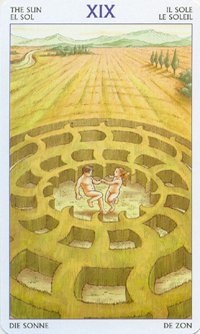 The Sun is one of my favorite cards, because it's pure joy. Simple, uncomplicated. Your inner light is burning like a torch, and the whole world is ahead of you.
It's no wonder there's often children in the imagery (like here, in the fascinating 78 Doors Tarot), because rarely do we have that attitude of "I can do anything" once we've grown up.
Yes, that's partly because children think they can do anything without the planning, focus, and learning from past mistakes. But it's partly because after a certain age, we don't really get the room.
We do a lot of things because we "have to." Because that's how it's done - jobs that bore us but bring in the money, holidays with family we hate, wearing uncomfortable shoes because they give us a certain "image." We're told we need to do these things to be succesful or to have respect.
And pursuing our hobbies and loves? Taking a vacation? Actually, gasp, making money? That's selfish. It means you aren't serving other people, and what they need. You ought to be ashamed.
Somewhere along the way, our society decided that misery was a sign of responsibility. That we couldn't follow our bliss without sacrificing everyone else along the way. And we couldn't be more wrong. The bliss we pursue, and the stability of the people and things we love, are completely connected.
There's a scene in the fabulous satire "Good Omens", where the demon Crowley talks about designing an overly-complicated highway system. He says that all he needs is some backed-up traffic. Because that means a thousand people go home stressed out and angry. They take it out on their spouse or significant other. Their spouse takes it out on their kids. The kids yell at the dog.
When we're dissatisfied with our lives, an aura of stress and frustration spreads out, ripples in a pond. And those little pebbles of anxiety do more damage than one person's bad decisions ever could. It means that our whole world is the result of our collective self-love. The way you feel, the story you tell about your life, sets the stage for the whole world. Being happy is one of the most unselfish things you can do.
Don't get me wrong - I'm not shaming someone who has, say, clinical depression. But it's all the more important, when you need to make it one day at a time, to imagine something you want even a little better. Because at our highest and at our lowest, a little goes a long way.
I'm not saying to neglect everyone else's feelings. No man is an island. How happy will you be until the people you love are happy too? Make them a part of your dreams - but there needs to be room for you.
Imagine the happiest possible future for yourself. What does that look like? And more importantly: why? Even if you imagine yourself zoned out on the couch watching TV all day, what about that appeals to you?
A love of entertainment? Take that love, study it, and turn it into a part-time stint as a critic.
A lack of responsibility? That's harder. How about this: craft a world where responsibility feels that effortless.
The more you listen to your "inner light" as a possible reality, instead of a hypothetical, the more you find out about yourself. The more you can craft yourself into the best possible person you can be, with the best possible life for you. That's our real job. Our constant learning, growing, and blossoming is what we'll need when we're six, sixty, or six hundred. It's not a destination, it's a journey.
So let's get to work.
|






 RSS Feed
RSS Feed

